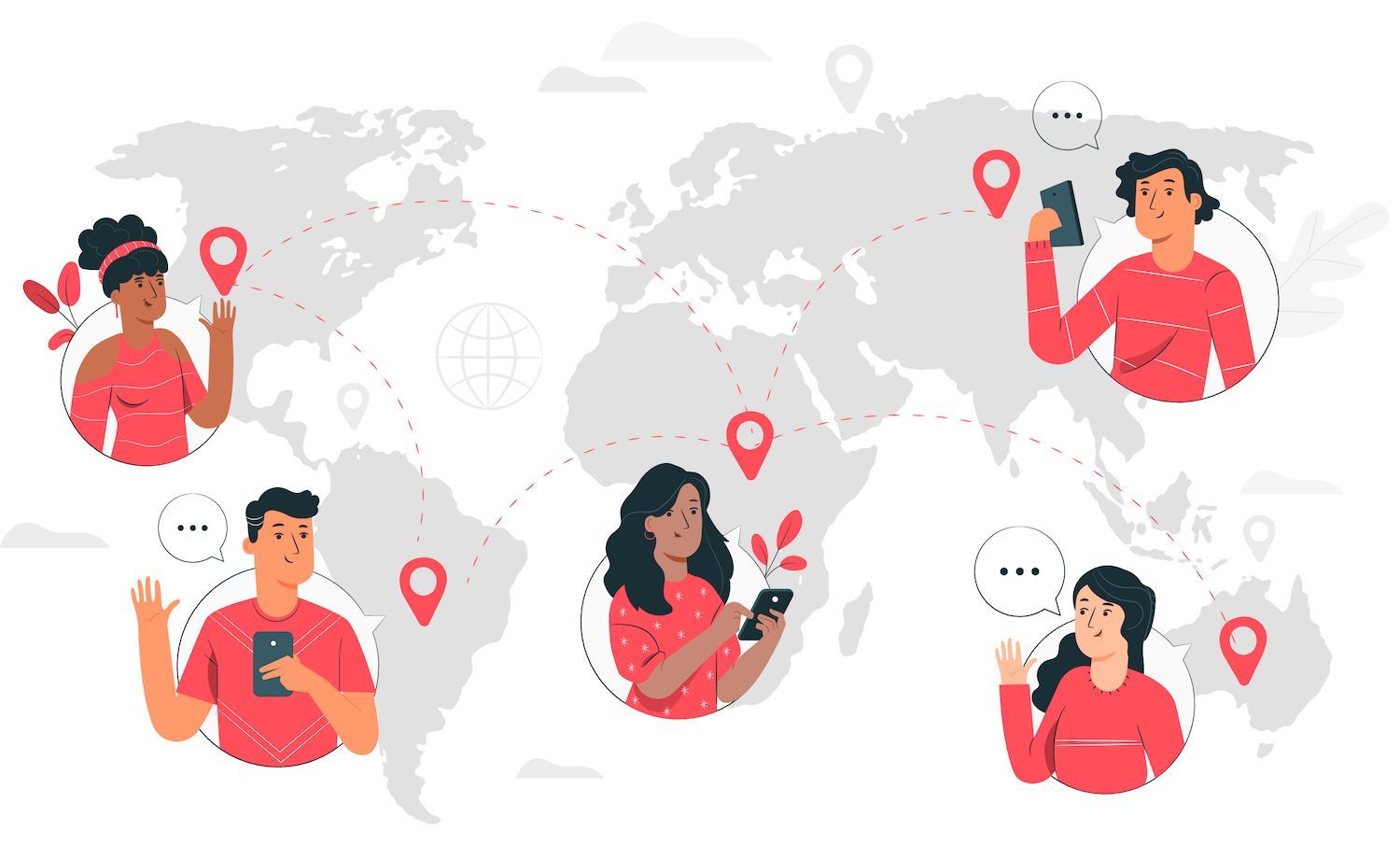Skool vs. Circle: What one is the most appropriate for a Community? |
In this post, we're looking at two communities that are popular: Skool and Circle. If you're seeking the ideal community platform that meets your requirements and needs, the answer is here.
We'll cover:
- What do Circle and Skool provide.
- Which is better to be used for community events, classes or marketing and monetization applications.
- A different option that's rated higher and comes with many.
Explore the community platform that has one of the largest communities with a total value of $1 million, absolutely free!
((toc))
What are they exactly?
Circle
In the year 2020, a number of the employees of the online learning platform Teachable started Circle. They spotted that Teachable was missing an option to engage in community involvement and opted to launch Circle to add it as an option. Live learning and learning communities were on the rise, and Teachable did not have the capacity to give these types of options. So, Circle was founded with an objective to incorporate with Teachable and to add the benefits of community-based learning to Teachable classes.
As time has passed, Circle has added course ability and has gotten rid of Teachable integrations. This makes it an entirely community-based system. The founders, including Pat Flynn and Brendan Burchard have been a component of the platform. Circle is a simple, user-friendly community platform that is organized in Spaces. It also has the option of adding classes or events.
Skool
Skool is a fundamental community site created by Internet celebrity, Sam Ovens. Recently, the popular Alex Hormozi purchased a stake in the business, and is attempting to market Skool via his social media accounts and through paid advertising.
Skool offers a function called Discoverability, which assists users with discovering communities they are interested in and Hosts who are members of Skool have the option of using it to provide online classes and coaching. Skool has also built an integrated calendar for users to manage a simple schedule. When compared to other communities platforms, Skool feels pretty basic and non-technical. However, it has users who enjoy it.
Skool and Circle the features that we're Comparing
If you're interested in understanding the differences between Circle and Skool it's important to be aware of a few aspects we need to study. On papers, Circle and Skool have some of the same functions: courses, events as well as community. But these are not created similarly.
In the following part We'll review each on:
- Community platform
- Capacity for courses
- Business and marketing tools
- Apps
Skool vs Circle
Platform for community-based interaction
Skool

It's a platform that Skool has a lot in common to forums that existed in the late 90s, with some Facebook Group characteristics. Posting is simple and the experience of members revolves around the roll-over threads feature. Members are able to post videos or polls GIFs along with links and attachments. Members are able to make comments, like, or look at posts and videos. It is also possible to organize posts by tags so that content can be classified into various categories.
The most effective feature for developing community might be one it Skool calls "gamification:" these are leaderboards where members are awarded a an amount depending on the amount they engage-the theory is that this function enhances the incentive for people to engage. Furthermore, you could add unlock options and automations to create bonuses that reward users with rewards for their engagement.

In terms of occasions, Skool has a scheduling facility built into. The calendar of events is readily available. It allows you to include information about events in a discussion section and send reminder emails automatically or set events to repeat.

The Limitations: Skool works okay for the purpose it was designed for. However, there are a few of major problems you should be aware of prior to building upon Skool.
- In general, the features are very limited in comparison to the community-based platform Circle. We'll get to that below.
- There's not many ways to create a larger community. If the community you're in is growing to hundreds of members the community is still limited to a single thread of messages.
- There is no way to RSVP to the events and there is no way to host them on Skool-you need a different platform.
Circle

Circle is a community platform that can organize community content into different types of Spaces. These include posts (discussion-feed fashion) and chat, events and classes. Members can join relevant Spaces and pay for or block access to other Spaces too. Circle can offer Circle the ability to host various types of content unlike Skool as well as more complex conversations in the community. The Spaces model means that you can host and market subgroups in the community, something which is almost impossible to do with Skool. Spaces' Spaces model lets you combine space access. So it is possible to create a community space that has activities as well as a course. This type of structure offers more choices that Skool has.
Posts could be any of the various media (video or text as well as polls). As opposed the other platforms like Skool, Circle has livestreaming that is a great option for meeting rooms, office hours (or live courses). It is possible to invite your cohosts to talk, and switch between a speaker and gallery view and then download recordings after.
Circle is also home to profiles pages as well as member directories However, (and it can be a bit annoying) the directories aren't usually activated automatically. If activated, you'll be able to determine who is a member in the group or specific Space and then start conversations. Additionally, you can assign members' tags (public as well as private) to categorize members according to their interest.

We will discuss the idea of the concept of. This was the Skool's bread-and-butter. However, Circle recently launched this feature and allows users to accumulate points, and earn points and levels of rewards for participating. Additionally, they have added a leaderboard feature to show participants who have the highest participation. In addition, Circle is now introducing workflows that let you give members a reward by automatically incorporating processes to help them get involved in activities such as secret spaces or specific courses.

Which one is your favorite?
Circle is. It's not something to compare to. While Skool seems a little similar to Facebook in the past, Circle feels more like Slack today. It gives you the ability to manage complex discussions as well as build an extensive community with moderators and admins as the community grows. It offers more options for delivering the information (livestreaming) and more ways to organize it (multiple Spaces and different types of Spaces), Circle is delivering an experience that's 10 years ahead of Skool.
The use of Circle's Spaces lets you scale the community management process, something that Skool does not. Skool certainly has some big communities but the community management that covers thousands of users isn't done exactly the same way.
Skool 's leaderboards are awesome but it's not clear if they will result in greater participation from the users. A few users may love this feature, especially when they are linked to bonuses that are locked. Now the fact that Circle offers them as well is not a feature that's an important selling point for Skool.
Visit our Community Name Generator
The AI engine that powers our platform is ready to aid you in establishing a community name that feels like magic. Simply share a few sentences on what your community stands in and let us get started.
Go
Examples: coaching clients, meditation novices, vegan chefs, dog lovers, aspiring entrepreneurs, etc.
Find Ideas
The names generated by Mighty Co-Host(tm) is used as examples only and can be utilized by other companies or under third-party rights. For more information, check our Terms.
Courses
Skool

The Skool courses are a part of the theme word of the community platform and the term"basics" is a reference to "basic."
It's a good thing that you can build sub-lessons, sections or course sections. Lessons can be made up of text or videos (these aren't natively hosted but it is possible to upload them via Vimeo as well as YouTube). Lessons may contain a discussion feature or you can switch between a video transcript or drip-based content.

Editing course content isn't as simple and it's not easy to edit courses. Before recently, the classes were edited through the "settings" tab. Skool has changed this. However, editing continues to occur at the bottom of the backend, not than a specific learning Space.
Once a course is running in the course, it's run on a "Classroom" tab of Skool. It's a great feature. It is also easy to navigate for students and quite easy to follow.
Another point. Skool isn't able to conduct live classes. The hosting of a live class or gathering would require an external software.
Circle

In Circle classes are offered through the space that is used for course. Because every Space is paywalled, or bundle, it also is the process of providing classes. Making a course using Circle is relatively simple. It is built on the outline using drag-and-drop blocks. It's the same as a traditional LMS. Lessons are made from videos, audio or downloads. You can additionally preview the lessons prior to beginning. Remember, the course material counts towards the overall capacity of the course.
Circle offers live classes as well, something that Skool does not. Live tools to conduct live classes, or hold office hours and meetings along with other learning opportunities.

What is the best option?
At the end of the day, Circle triumphs in this case. Its synchronous platform is as great as or better than Skool's, and it includes more tools for creating lessons. But, it is also capable of teaching live in real time, something is not possible on Skool.

Marketing & Monetization
Skool
While it's not the most ideal course and community service, Skool has one main benefit. Its discovery method. As opposed the Circle users, people who sign up to Skool will be directed to a discovery section (a bit like Substack's homepage). This shows you a ton of community groups and will assist members of news organizations discover your profile. But, remember that it's not sufficient in it's own to be a significant difference. There are a lot of Skool communities, so it's unlikely that you'll find yours (although having a niche that is strong or long-tail keyword can aid).
In terms of monetization, Skool also has an affiliate program, but it's not a Skool affiliate Program. This is how it works When you refer those members of the community who pay Skool when that individual establishes the community of their choice You will be paid 40 percent of their monthly payments.
In the moment of writing this article, Skool just added its own payment method. All prices on Skool are charged in USD in case you aren't in the US the payment is in your local currency.
Skool does not have any distinct landing pages. Visitors can select to join a community or make a purchase on a course through the link. Skool is not a website with an email address, also.
Also, Skool doesn't currently have an option to include your own branding to the Skool community. The only option is a logo image to be used as the header.
Circle
You could create an affiliate program through Circle which means you could pay others to assist in selling and promoting your community.
Circle provides more branding options over Skool too, with the option of dark and white and tools to alter the look and appearance of your community. It is possible to add a customized domain name for Circle also. To further customize, you can add in various code fragments that are part of the Circle community. You can style it using the CSS option, or implemented integrations that are coded, like Google Analytics tracking code.
Integrations Circle has thousands of integrations as well-mixed between native integrations as well as Zapier. Native integrations comprise Memberstack, WordPress, Loom, Stripe, and Vimeo.

Which one is the best?
The Skool Discover section looks amazing, however there's no indication that this will contribute to an increase in the size of your community. There's still plenty of Skool community members to be recognized. Circle's agreement results in lower front-end visibility but it also means less distracting elements.
If branding matters to you, remember that you can't put your logo directly onto Skool. If you are an independent creator of content, this may be a hassle. For brands that are established and creators it is likely to be an issue. The activities are all in the Skool community, which creates the reputation of their brand. Circle can be utilized to create a brand image that represents the values of your. Also, Circle is a great tool to build a complete technology stack.
Cost Comparative
Skool
- $99/month +2.9 percent cost of transaction (one only)
Circle
- $49/month plus 4transaction charges Basic plan (Community Only)
- Monthly cost of $99 plus 2% charges - Pro Plan (add Livestreaming, courses and branding)
- $119/month + 1% charges Business plan (add workflows and custom fields, as well as white-labels to email and AI help)
- Monthly cost of $399 plus .5 percent fees for Enterprise (add SSO, analytics, 10 admin along with 100 mods)
Apps
Skool
Skool is an application for any device, which replicates some aspects of the online-based web application. As as of this date, it's rated 3.6 ratings on Google Play Store and 3.8 stars on the App Store. The app doesn't offer the choice to have an app that has white labels.

Circle
Circle has apps that are much better-rated over the Skool applications (4.5 stars on Google Play and 4.9 on the App Store) that makes the user experience on mobile much better. But Circle offers the possibility to add branded apps to the community, allowing you to make your app available for sharing with Apple and Android.

Which is the best?
The end result is that Circle wins here too. Their apps are better than the competition and are in line with to the community's Design(tm) in addition to you can choose to switch to the apps associated with the Circle brand.
Skool Vs Circle: Which one is the best?
Circle is. It's the top prize in each category we studied here:
- A more powerful community platform, with Spaces for large discussion Livestreaming, livestreaming, and many more overall capabilities.
- Both live and asynchronous courses.
- You can add your personal branding to create an experience for your students or community that is professional.
- Fantastic apps for all devices and brand-name applications if you're in the market for.
And-depending on your plan-Circle can provide its service at a comparable (or even lower) cost to Skool. What is the reason you would spend more for Skool when it provides only a fraction of its capacity of the community?
But there's another option...
G2's top-rated community-based platform
Even though Circle rates better than Skool but there's another community-based service that's higher reviewed over Circle but at a cost which is similar.
is the most popular community platform on G2. G2 is home to more than $1 million communities which are bigger than others community, and is a trusted partner for designers and brands such as Tony Robbins, Mel Robbins, Jim Kwik, Marie Forleo, TED, and Matthew Hussey.
Here's what Mighty compares to both Circle as well as Skool.
More community-building
Circle is home to Spaces which assist in forming a more unified community. You must select from the different types of Spaces that you'd like. It is therefore not possible to put a course or an event and a community in the same space.
Mighty takes Spaces one step further.
On Mighty, Spaces are container where you can put any type of feature like an Table of Contents for a Course and Activity Feeds chat rooms, members, repeating occasions, One-time Events page (an article) or highlighted hashtags.
So, what does this signify?
This means that, should you think that the Circle community requires activities, classes or groups in other Spaces, Mighty lets you build using the features you want (turning off features you do not need).

Software that is designed for engagement
There is more to it than the content you provide. Our research shows with 93% accuracy the communities that will be either successful or fail. The key is how well members interact with one another.
Our software does exactly that. People Explorer is a tool that People Explorer helps your members discover people with similar background, interests and even geographical distance. (Mighty Co-Host(tm) assists users in the creation of profiles too. )
The AI engine can tell what you've shared as well as start a conversation. With smart tools like that from the Infinite Question Engine to automate the discussion (generating and posting approved questions regardless of whether you're online or not.) You've got a platform that's constantly building engagement.

AI will make administrative tasks easier
Mighty is developing AI tools that will make your admin easier.
- You can create a community in a matter of minutes. Simply add a few words in Mighty Co-Host(tm) then it'll create the Big Purpose and a basic image of the brand and an initial Space. (Try at no cost)
- Find writing prompts, improvements Discussion questions, writing prompts and the outline of your course and hashtag suggestions for improving the engagement of students and increase their creativity.
- "Activity Assist" will show you users who haven't been active and verify their existence (AI may even provide the discussion starting point).
These are functions that communities platforms don't yet offer yet.

And then

The app allows you to establish any kind of community that you like and make it a monetization option in 135 different currencies, join ConvertKit or add more than 22,000 embeds that can be integrated, and build under the brand of your choice. The app store has great apps that run on any device, and has created more than 400 brand-name apps to many most renowned makers and brands.
Start now! You may be inviting your first customers within a few minutes, and there's no need for a credit card to test.
This post was posted on here
